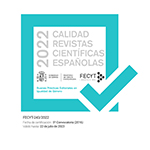Submissions
Submission Preparation Checklist
As part of the submission process, authors are required to check off their submission's compliance with all of the following items, and submissions may be returned to authors that do not adhere to these guidelines.-
Submitting an article to this journal implies the acceptance of the Declaration of Originality and Authorship.
Download file.It is advised that the articles have a maximum of 4 authors. In the case of a larger number, EMP will consider whether the work in question can justify that number but will always warn the first signer about this issue
-
The format of the file sent is OpenOffice, Microsoft Word or RTF.
-
Web addresses have been included for references whenever possible.
-
DOI references have been included when available.
-
The text meets the reference and style requirements described in the Author Guidelines, which may be found in About the Journal.
-
If you are submitting something for a peer-reviewed section of the journal, please make sure you have followed the instructions in Ensuring a Blind Review.
Copyright Notice
In order to support the global exchange of knowledge, the journal Cuadernos de Trabajo Social is allowing unrestricted access to its content as from its publication in this electronic edition, and as such it is an open-access journal. The originals published in this journal are the property of the Complutense University of Madrid and any reproduction thereof in full or in part must cite the source. All content is distributed under a Creative Commons Attribution 4.0 use and distribution licence (CC BY 4.0). This circumstance must be expressly stated in these terms where necessary. You can view the summary and the complete legal text of the licence.
Privacy Statement
Basic information on treatment data protection: Publications Service
| Controller | Vicerrectorado Cultura y Deporte y Extensión Universitaria, +info |
| Purpose | Dissemination and sale of UCM’s publishing/ billing and shipping of publications +info |
| Legitimacy | Mission in public interest; execution of a contract +info |
| Recipients | No data will be transferred to third parties, except legal obligation +info |
| Rights | Access, rectify and erasure data, as well as other rights, explained in the additional information +info |
| Additional information | You can find more detailed information on our website: https://www.ucm.es/file/info- |








